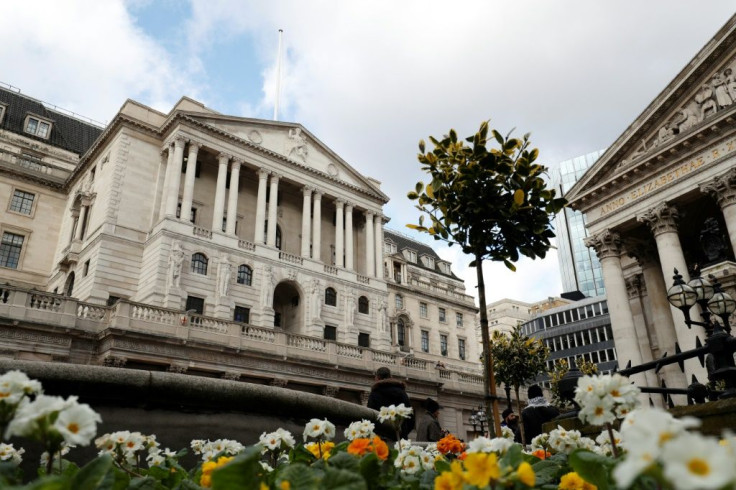Bank Of England Keeps Interest Rates Unchanged, Warns Of Very Deep Recession

KEY POINTS
- The Bank of England kept interest rates unchanged at 0.1%
- The BoE projected that the British economy may contract by 14% this year
- BoE said it expected the jobless rate to soar to 9% this year
The Bank of England kept interest rates unchanged at 0.1% on Thursday but warned that the U.K. will suffer its deepest recession in history as the Covid-19 crisis was "dramatically reducing jobs and incomes.”
The BoE projected that the British economy may contract by 14% this year – the largest annual decline in recorded history -- assuming the nationwide coronavirus-related lockdown and social distancing measures are phased out between June and September. That projection includes an unprecedented 25% plunge in gross domestic product in the second quarter.
"The spread of COVID-19 and the measures to contain it are having a significant impact on the United Kingdom and many countries around the world,” the BoE stated. "Activity has fallen sharply since the beginning of the year and unemployment has risen markedly. U.K. households entered this period of economic disruption in a stronger position than they were before the 2008 financial crisis.”
The BoE added: "While the policy response will provide substantial support to households, the sharp fall in economic activity will put pressure on some households' finance. We are vigilant to [the] risks that could emerge once payment holiday measures end, including borrowers seeking to refinance in the coming months."
BoE also said it expected the jobless rate to soar to 9% this year, up from 4% currently.
BoE governor Andrew Bailey characterized the downturn as "unprecedented" and warned consumers will remain reluctant to spend money even after lockdown restrictions are removed. BoE noted that Britain’s construction and housing industry has stalled, while consumer spending plummeted by 30% in the past few weeks. Shopping at High Street retailers has plunged by some 80%, the BoE added.
But the BoE expects the economy to rebound in 2021, by growing at 15%.
"Not all of the economic activity comes back,” Bailey told BBC. “There's quite a sharp recovery. But we've also factored [in] that people will be cautious of their own choice. They don't re-engage fully, and so it's really only until next summer that activity comes fully back."
On a brighter note, Bailey said he did not expect there to be much permanent damage from the pandemic and that the British economy will recover "much more rapidly than the pullback from the [2008] global financial crisis.”
However, given the unpredictable and unprecedented nature of the pandemic, the BoE emphasized that its projections were "unusually uncertain" and subject to many factors, including how businesses and households respond to the crisis.
Bailey also commended the government for its efforts to support businesses and workers via wage subsidies, loans and grants.
"The furloughing scheme really does enable people to come back into the economy more quickly so it's a much quicker recovery [than] we've seen in the past," he said.
The BoE’s Monetary Policy Committee, or MPC, was divided over the issue of providing more stimulus into the British economy. Two of the nine committee members -- Michael Saunders and Jonathan Haskel -- voted to increase quantitative easing measures by £100 billion to £300 billion ($123 billion to $370 billion) -- beyond the current £645 billion ($795 billion) asset purchase program.
Since the start of the pandemic, the BoE has cut rates twice -- from 0.75% to 0.1%, an all-time low.
James Smith, research director at the Resolution Foundation, an independent British think tank, estimated that the economic crisis this year will be equivalent to a £9,000 ($11,000) loss for each family in the U.K.
"Faced with this huge economic hit, both the [BoE] and the government have made the right call in taking bold action to protect firms and families as much as possible,” he said.
Kerstin Braun, president of Stenn Group, a global trade finance provider, commented: "The Bank of England has stayed put on interest rates and quantitative easing for now, reserving firepower for the long recovery ahead. We could see more bond buying next month, depending on the extent of the lockdown. Like all central banks, the BoE has no other choice but to try to spend its way out of the crisis, leaving the question of who pays the tab for another day.”
Braun added: "It is anybody’s guess how long and deep this recession will be. While we don’t know what the ‘new normal’ will look like, we do know consumer and business life will not be the same as before, even after social distancing measures are eased."
Other economists think the BoE was too optimistic in its expectations for an economic rebound in 2021.
“We see this forecast as credible for 2020, but are less convinced by the 2021 recovery, where we take a more cautious view, implying weaker growth, lower inflation, wider deficits and more MPC action,” said Jacob Nell, chief UK economist at Morgan Stanley.
© Copyright IBTimes 2025. All rights reserved.





















